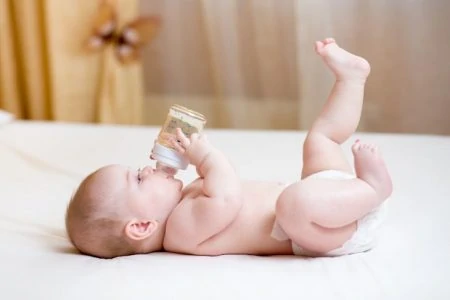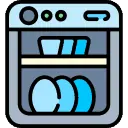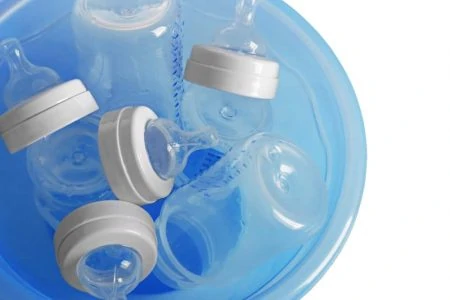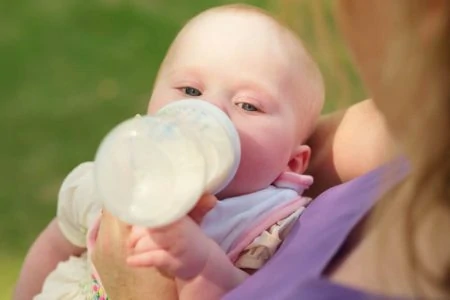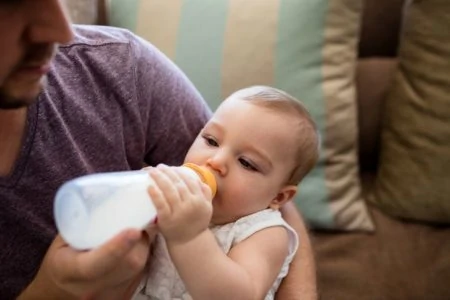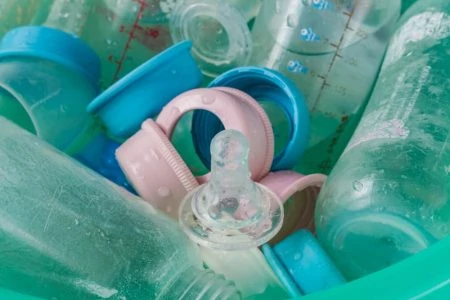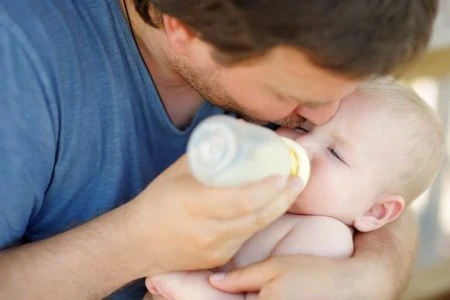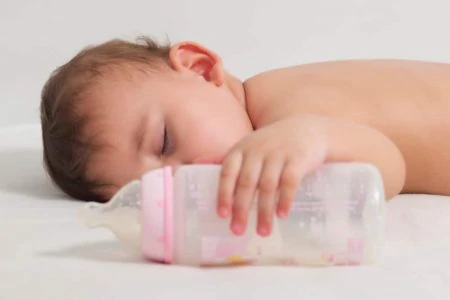Are you ready to ditch the plastic and go green? If you are looking for vessels free from harmful chemicals like BPA and phthalates, glass is the answer.
Glass baby bottles are non-toxic, durable, and much easier to clean than their plastic counterparts. They don’t absorb odors, and they last for years.
We tested the best glass baby bottles on the market to help you find a safe, high-quality option for your little one.
- Have “petals” that makes nipple softer
- This anti-colic system
- Ergonomic design
- Withstand sudden temperature changes
- Comes with silicone sleeve
- Helps reduce colic
- Sturdy, attractive design
- Helps preserve vitamins in milk
- Wide necks for easy cleaning
- Everything is dishwasher safe
- Withstand sudden temperature changes
- Easier to grip
- Easy to grip
- Angled for more comfortable hold
- High-quality glass
Should You Use Glass Baby Bottles?
When I had my first baby, I didn’t see the harm in buying plastic bottles. They were cheap, lightweight, and wouldn’t shatter if I dropped them. I honestly didn’t understand why anyone would choose glass over plastic.
But after using plastic for a few months, I saw the appeal of glass. It was impossible to keep those plastic bottles really clean. They developed a cloudy film that refused to wash off, no matter how much I scrubbed.
I developed a serious case of bottle envy seeing the sparkling glass bottles my friend used. Plus, I started worrying about health risks. We know about BPA, but plastic can contain other questionable components (1).
We sanitize bottles, breastfeed, and buy special detergents. It doesn’t make sense to ignore the materials we feed our babies with. Here is why switching to glass is a smart move.
The Benefits of Glass Bottles
- No chemicals: Glass is made from silica and contains no nasty chemicals. It is the safest bet for your baby’s milk.
- No residue: Fat from breast milk sticks to the sides of plastic bottles. Glass stays clean and ensures your baby gets all those nutrients.
- Safer heating: When you heat plastic, chemicals can leach into the milk (2). You can warm glass bottles without releasing toxins into your baby’s food.
- Scratch-resistant: Plastic scratches easily, creating hiding spots for bacteria and grime. Glass is tough and stays hygienic longer.
- Better taste and smell: Plastic absorbs odors and can make milk taste funny. Glass is non-porous, so the milk tastes exactly like milk.
Plastic bottles degrade over time. Glass bottles can last through multiple children, making them a better long-term investment.
Editor's Note:
Katelyn Holt RN, BSN, BCThe Disadvantages of Glass Bottles
Glass is great, but it isn’t perfect for everyone. Here are a few things to consider before you buy:
- Weight: Glass is heavy. It might be too much for your little one to hold if they are learning to self-feed.
- Cost: Plastic is cheap. Glass bottles cost more upfront, though they last longer.
- Breakability: This is the big worry. Glass can shatter if dropped on a hard floor, though silicone sleeves help prevent this.
- Availability: You can find plastic bottles at any gas station or grocery store. You might have to hunt a bit harder for high-quality glass options.
- Limited styles: Because they are less common, you won’t find as many shapes, sizes, or colors as you do with plastic.
Product Reviews
We analyzed the top contenders to help you choose the safest and most durable option. Here are the best glass baby bottles on the market.
Philips Avent Natural Glass Baby Bottles
Best Glass Baby Bottles for Breastfed Babies
This set includes three 8-ounce bottles made from premium borosilicate glass. They are heat and thermal shock resistant, so you can safely store them in the fridge and warm them up without worry.
The Philips Avent bottles are excellent for breastfed babies. The wide, breast-shaped nipple encourages a natural latch, making it easier to combine breast and bottle feeding. The unique “petals” inside the nipple increase softness and flexibility without allowing it to collapse.
Cleaning is a breeze thanks to the wide neck and minimal parts. They also feature an advanced anti-colic system to vent air away from your baby’s tummy. While they come with slow-flow nipples, they are compatible with the entire Philips Avent Natural range.
The ergonomic shape makes the bottle easy to hold, even during those long midnight feeds.
Pros
- Petal design keeps the nipple soft and prevents collapse during feeding.
- Anti-colic valves reduce air intake and potential discomfort.
- Ergonomic shape helps you and your baby grip the bottle securely.
Cons
- Extreme temperature changes can still cause breakage in rare cases.
- Some parents report minor leaking around the rim if not tightened perfectly.
Our Ratings
Joovy Boob Glass Baby Bottles
Best Glass Baby Bottles for Colic and Gas
The Joovy Boob glass bottles are designed to stand up to daily life. This three-pack of 8-ounce bottles features a unique 5-stage baking process that makes the glass incredibly durable.
The standout feature is the CleanFlow vent system. It fits into the neck of the bottle and prevents air bubbles, significantly reducing the risk of colic and gas. Unlike other complicated vents, this one is easy to clean and reassemble.
This set includes silicone sleeves for added grip and drop protection. You also get medium flow nipples, caps, and stage 1 nipples. The glass can withstand temperatures up to 176 degrees Fahrenheit, handling the transition from warming to feeding with ease.
Pros
- Resistant to thermal shock from freezers or bottle warmers.
- Includes a silicone sleeve for better grip and breakage protection.
- CleanFlow vent effectively reduces colic symptoms.
Cons
- Higher price point than standard glass bottles.
- Printed measurements may fade after repeated washing.
Our Ratings
Dr. Brown's Wide Neck Glass Baby Bottles
Best Convertible Vent Glass Bottle
Dr. Brown’s is famous for its internal vent system, and this glass version delivers the same benefits. The pharmaceutical-grade borosilicate glass is durable yet feels surprisingly light when paired with the silicone sleeve.
The internal green vent system is clinically proven to reduce colic. It creates a vacuum-free feeding experience that mimics breastfeeding and prevents air bubbles from mixing with the milk. This helps preserve vitamins C, A, and E, which are susceptible to oxidation.
The best part? It grows with your baby. You can remove the internal vent system once your child’s digestion matures, using it as a standard nipple-vented bottle. All parts are dishwasher and sterilizer safe.
Pros
- Proven to reduce colic, spit-up, and burping.
- Vacuum-free feeding preserves nutrients in breast milk and formula.
- Wide neck design makes it easier to clean than the narrow version.
Cons
- More parts to clean than standard bottles.
- The glass can chip if dropped on hard surfaces.
Our Ratings
NUK Simply Natural Glass Bottles
Best Budget Glass Baby Bottles
You don’t have to break the bank to go plastic-free. The NUK Simply Natural set is affordable and comes with three 4-ounce bottles, perfect for newborns.
The glass is thick and sturdy, holding up well to daily abuse. It is a great choice if you are worried about fragility but don’t want to pay a premium. The nipples feature multiple holes modeled after a mother’s breast, ensuring a natural flow that varies just like breastfeeding.
The advanced anti-colic air system is built right into the nipple, so there are no extra tubes or valves to scrub. You can boil, steam, or microwave sterilize these bottles without fear.
Pros
- Very durable glass resists breakage.
- Budget-friendly price point.
- Simple design is easy to clean and assemble.
- Multiple nipple holes mimic natural milk flow.
Cons
- Not designed for extreme temperature shocks (avoid freezer-to-boiling).
- Some parents find the lids difficult to snap off.
Our Ratings
Lifefactory BPA-Free Glass Baby Bottles
Best Newborn Glass Baby Bottles
Lifefactory bottles are iconic for their colorful, grippy silicone sleeves. This set includes two 4-ounce bottles, ideal for newborn feeds. They come with Stage 1 nipples and a medical-grade silicone teether.
These bottles are made of borosilicate glass, which is thermal shock resistant. You can take a bottle of breast milk from the freezer and pop it straight into boiling water without it shattering. This is a huge timesaver for pumping moms.
The sleeves provide an excellent grip and shock absorption if dropped. The bottles are compatible with most major breast pumps and can be converted into sippy cups or snack jars later, extending their lifespan for years.
Pros
- Dishwasher safe with the sleeve on.
- Freezer-safe and thermal shock resistant.
- Silicone sleeve provides excellent grip and protection.
Cons
- High price tag per bottle.
- The sleeve makes it harder to read ounce markings and see milk levels.
Our Ratings
Simba 9-ounce Ultra Light Bottles
Best Glass Baby Bottles for Travel
Glass bottles are notoriously heavy, but Simba solves that problem. These bottles are made from medical-grade borosilicate glass that is incredibly thin and lightweight. They are perfect for travel or for babies learning to hold their own bottle.
Despite being thin, the glass is tough. It withstands heat up to 1,112 degrees Fahrenheit and sudden temperature changes of up to 446 degrees. You can steam sterilize or boil them without a second thought.
The nipple features a smart air-venting system to reduce colic and a specially designed flow that prevents messy leaks. The wide neck makes hand-washing in a hotel sink much easier.
Pros
- Significantly lighter than other glass bottles.
- High heat and thermal shock resistance.
- Wide neck allows for easy cleaning on the go.
Cons
- Thin glass feels more fragile and requires careful packing.
- Does not come with a protective silicone sleeve.
Our Ratings
Chicco Natural Fit Glass Baby Bottles
Best Glass Baby Bottles for Transitioning
The Chicco Natural Fit features a unique angled nipple that mimics the natural shape of a breast. This promotes a proper latch and keeps the nipple full of milk, reducing air intake.
The ergonomic tilt also allows you to hold the bottle in a comfortable, natural position while feeding, which helps reduce neck strain for you. It comes with a soft, satin-textured silicone nipple that feels skin-like to the baby.
These bottles include a silicone sleeve for grip and protection. The wide neck is easy to clean, and the glass is safe for the dishwasher, microwave, and steam sterilizer. It is an excellent choice for switching between breast and bottle.
Pros
- Angled nipple promotes a consistent latch and reduces air ingestion.
- Includes a cheerful silicone sleeve for grip.
- Ergonomic shape is comfortable for parents to hold.
Cons
- Some users report nipple collapse with strong suction.
- Not rated for freezer storage.
Our Ratings
Do Glass Baby Bottles Break Easily?
Many parents fear their glass bottles will shatter constantly. In reality, modern glass bottles are tougher than you think. Unless you are tossing them onto concrete, replacement isn’t a frequent issue.
You only need to replace them if they shatter, chip, or crack (3). To minimize accidents, avoid piling them in a slippery sink with heavy pots and pans. Wash them separately or one by one.
If you are worried about clumsy hands, buy bottles with silicone sleeves. They add a layer of bounce protection and grip. Even if the glass inside breaks, the sleeve often contains the shards, keeping the mess manageable.
How Do I Care for Glass Bottles?
You clean glass bottles just like plastic ones, but they have some distinct maintenance advantages:
- Boil away: You can boil glass to sterilize it without worrying about degrading the material or releasing microplastics. This is a cheap, effective way to keep things sanitary.
- Quick drying: Glass retains heat from the wash water, which helps it air-dry faster than plastic. This reduces clutter on your drying rack.
How to Sterilize Glass Baby Bottles
You don’t need to sterilize after every feed unless your baby is premature or has a compromised immune system. However, you should definitely sterilize them before the first use.
The dishwasher is usually sufficient. Place bottles on the top rack and run a hot cycle with a heated dry. Alternatively, boil them in a pot of water for 5 to 10 minutes.
Glass is also compatible with electric steam sterilizers and microwave bags. Just be sure to let the glass cool down before handling it, as it holds heat longer than plastic.
How to Warm Glass Baby Bottles
Never microwave a baby bottle. It creates dangerous hot spots that can burn your baby’s mouth.
Most bottle warmers work fine with glass, but always check the manual. Glass conducts heat faster than plastic, so your milk might warm up quicker than you expect.
If you don’t have a gadget, simply hold the bottle under hot running water or place it in a bowl of warm water for a few minutes. Swirl the milk (don’t shake) to distribute the heat evenly.
